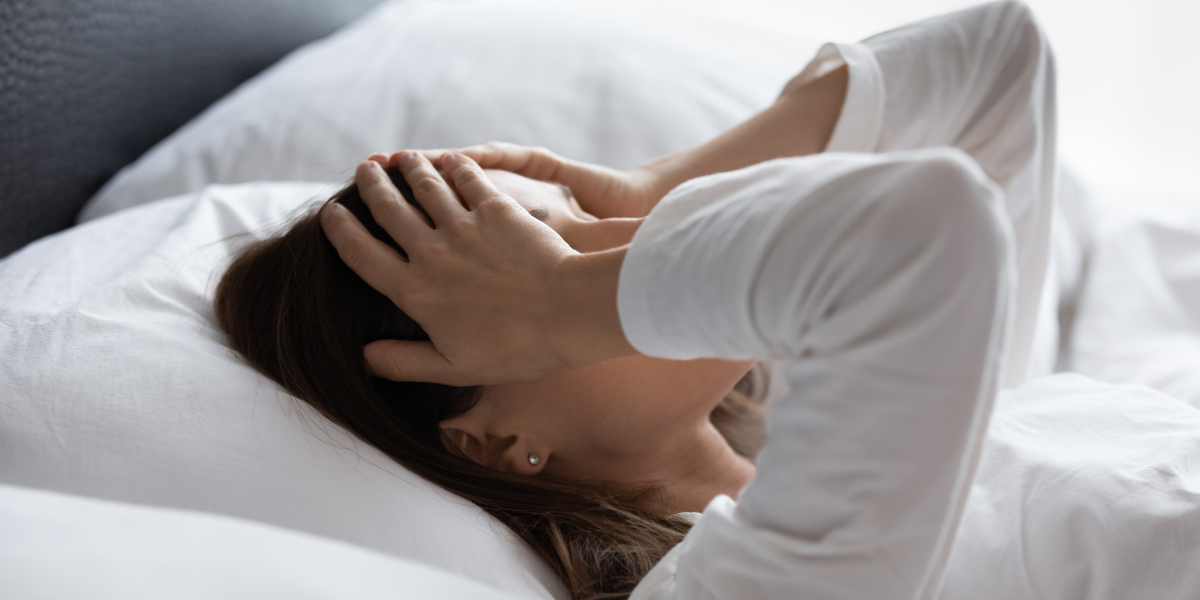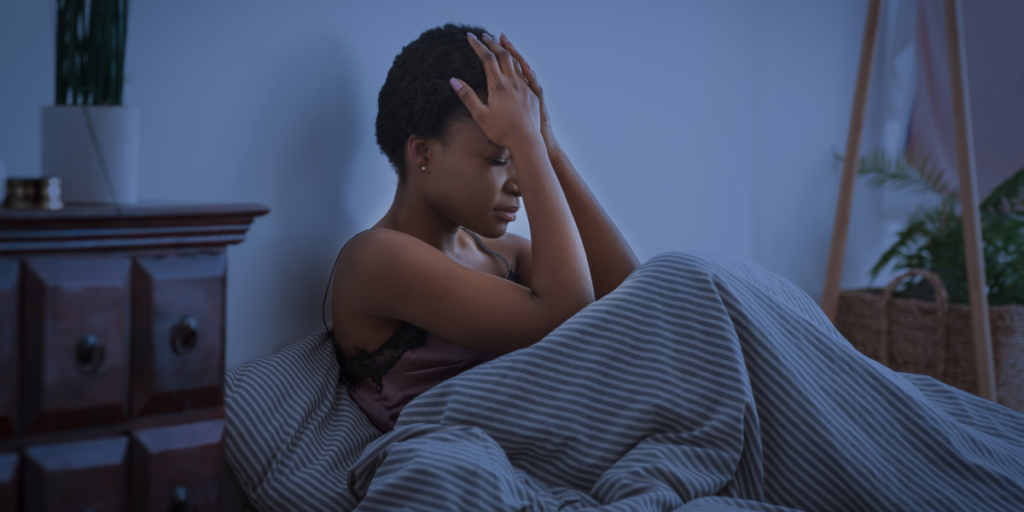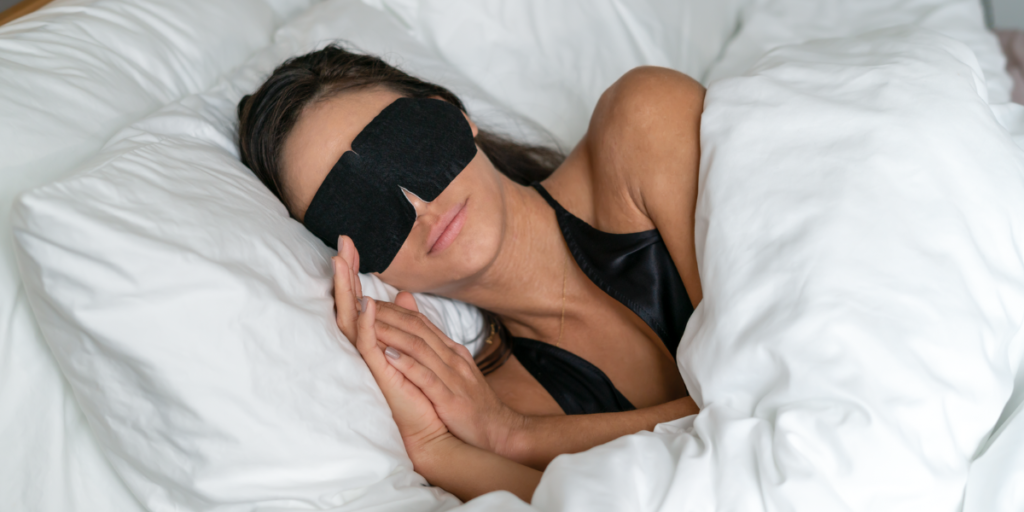Key Takeaways:
- The Sleep Quality Factor: Discover why the quality of your sleep is more important than the number of hours you sleep.
- Hidden Sleep Disruptors: Learn how stress, lifestyle habits, and health conditions might silently sabotage your rest.
- Actionable Sleep Solutions: Practical tips to improve your sleep quality and wake up feeling energized and ready for the day.
Ever wondered why you still feel exhausted after a full night’s sleep? At Reposé, we understand that achieving true rest isn’t just about clocking in hours; it’s about the quality of those hours. As pioneers in self-care solutions, we’ve crafted products like our Self Heating Eye Mask to help you attain the restorative sleep your body craves. In this article, we’ll explore common reasons behind lingering fatigue despite adequate sleep and offer practical tips to help you wake up refreshed and revitalized.
Poor Sleep Quality vs. Sleep Quantity: The Difference That Matters
Many people believe that spending a specific number of hours in bed guarantees a good night’s sleep. However, the equation is not so straightforward. Sleep isn’t only about quantity but also about quality. Without high-quality sleep, even extended rest can leave you groggy and unrefreshed. Here, we’ll explore what defines sleep quality, identify common disruptors, and uncover the signs that poor quality might be the real culprit behind your fatigue.
What Is Sleep Quality?
Sleep quality refers to how effectively your body transitions through the various sleep stages, including light sleep, deep sleep, and REM sleep. These stages are critical for physical restoration, emotional regulation, and memory consolidation. When the natural flow of these stages is interrupted, your body doesn’t reap the full benefits of sleep, leaving you feeling drained despite spending adequate time in bed.
Frequent Awakenings And Their Impact
Waking up multiple times during the night, even for brief moments, can significantly harm sleep quality. These interruptions prevent your body from maintaining a steady cycle through restorative sleep stages, particularly deep and REM sleep, which are essential for feeling truly rested.
The Role Of Inconsistent Sleep Patterns
Irregular bedtimes or waking at inconsistent times disrupt your circadian rhythm, your body’s internal clock that regulates sleep-wake cycles. A confused circadian rhythm can lead to fragmented sleep, making it harder to achieve the deeper stages needed for rejuvenation.
How Your Environment Affects Sleep Quality
An uncomfortable sleep environment—whether due to excessive noise, improper lighting, or an unsuitable mattress—can lower your ability to fall and stay asleep. Even minor discomforts may keep your body from fully relaxing, which in turn reduces the overall quality of your sleep.
Recognizing The Signs Of Poor Sleep Quality
Feeling fatigued despite getting what seems like enough sleep is a major red flag for low sleep quality. If you often wake up during the night, struggle to feel rested, or rely heavily on caffeine to get through the day, these could all point to problems with the quality, rather than the quantity, of your rest.
Relax, refresh, and restore your sleep routine with Reposé’s Self Heating Eye Masks. Shop now and experience soothing comfort for truly restful nights!
Hidden Factors That Disrupt Your Sleep
Sleep problems often go deeper than a noisy environment or a late bedtime. Hidden factors such as stress, daily habits, and underlying health conditions can quietly erode your sleep quality over time. Understanding these disruptions is the first step toward regaining restorative rest.
- Stress: Elevated cortisol levels from stress keep your mind and body alert, disrupting your ability to fall and stay asleep. Symptoms include difficulty falling asleep, waking up restless, and experiencing vivid dreams or nightmares.
- Lifestyle Habits That Impact Sleep: Day-to-day choices can influence your sleep quality. Late-night screen time reduces melatonin production, irregular schedules disrupt your circadian rhythm, and consuming caffeine or heavy meals before bed keeps your body too energized to rest.
- Sleep Disorders and Health Issues: Conditions like sleep apnea, restless leg syndrome, or undiagnosed health problems such as anemia or hypothyroidism can lead to micro-awakenings and chronic fatigue. These often require professional diagnosis and targeted treatment.
Recognizing these factors can help you pinpoint the root causes of poor sleep and take steps toward lasting improvement.
How Technology Could Be Harming Your Sleep
In today’s technology-driven world, gadgets have become a fixture in nearly every aspect of life, including your evening routine. While scrolling through social media or streaming shows may seem like a way to unwind, these habits can subtly sabotage your sleep. From blue light exposure to mental overstimulation, understanding the ways technology affects rest is essential for healthier sleep habits.
The Impact Of Blue Light On Sleep
Electronic devices such as smartphones, laptops, and tablets emit blue light, which interferes with your body’s production of melatonin—a hormone critical for sleep. Exposure to blue light tricks your brain into thinking it’s still daytime, delaying the release of sleep hormones. As a result, your sleep cycle shifts, making it harder to fall asleep and stay on a consistent schedule.
Endless Scrolling And Mental Stimulation
Using technology right before bed, whether for checking emails, playing games, or scrolling social media, keeps your brain active at a time when it should be winding down. This mental engagement prevents the natural relaxation process necessary for sleep. Instead of transitioning smoothly into rest, your mind stays alert, delaying the onset of deeper, restorative sleep stages.
Noisy Notifications And Sleep Disruptions
Leaving your phone or other devices near your bed can lead to interruptions during the night. Vibrations, chimes, or even the faint glow of notifications can disrupt deep sleep phases, causing micro-awakenings that leave you feeling groggy the next day. Even if these disruptions seem minor, they can cumulatively erode the quality of your rest.
The Role Of Nutrition And Hydration In Sleep Quality
Your diet and hydration habits don’t just impact your energy and health during the day—they play a crucial role in how well you sleep at night. Certain foods and beverages can either enhance your sleep quality or disrupt it, highlighting the important link between nutrition and restorative rest. Understanding what to eat, drink, or avoid before bed can help you create a nightly routine that supports optimal sleep.
Foods That Support Better Sleep
Certain foods are natural allies for better sleep, as they promote the production of sleep-regulating hormones like melatonin and serotonin. Bananas, rich in magnesium and potassium, help relax your muscles and prepare your body for rest. Almonds and walnuts offer melatonin along with healthy fats, which foster relaxation and stability in your sleep cycles. Additionally, cherries serve as a natural source of melatonin, making them an ideal bedtime snack. Incorporating whole grains into your evening meal can further boost serotonin levels, calming your mind and paving the way for a restful night.
Foods And Drinks To Avoid Before Bed
Just as some foods promote sleep, others can disturb it, leading to tossing and turning through the night. Caffeine, found in coffee, tea, chocolate, and many energy drinks, remains in your system for hours and can make falling asleep difficult even if consumed earlier in the day. Spicy or heavy foods often trigger indigestion or heartburn, interrupting your sleep. Similarly, sugary snacks can cause blood sugar spikes that disturb your ability to stay asleep, leaving you feeling groggy in the morning.
Hydration: A Balancing Act
Proper hydration is critical for your overall well-being, but timing is key when it comes to sleep. Drinking too much water close to bedtime increases the likelihood of nighttime bathroom trips, disrupting your sleep cycle. To prevent this, focus on staying well-hydrated during the day and reduce fluid intake in the hours leading up to bed. This strategy ensures your body remains hydrated without compromising your sleep.
Alcohol And Sleep: A Misleading Combo
While alcohol may initially make you feel drowsy, its impact on sleep quality is often negative. Alcohol disrupts REM sleep, a critical stage where your brain processes memories and restores emotional balance. This can leave you feeling unrefreshed and mentally foggy, even after a full night of sleep. Over time, relying on alcohol as a sleep aid can exacerbate these issues, making it harder to achieve truly restorative rest.
How To Improve Sleep Quality And Wake Up Refreshed
Achieving the feeling of being truly refreshed when you wake up involves more than simply spending eight hours in bed. High-quality sleep depends on a combination of consistent habits, a calming bedtime routine, and a supportive sleep environment. By making intentional adjustments to your daily and nightly routines, you can enhance your rest and start each day feeling energized and ready.
Stick To A Consistent Sleep Schedule
Your body’s internal clock, or circadian rhythm, thrives on routine. Going to bed and waking up at the same time every day, including weekends, helps regulate this natural system. A consistent schedule makes it easier to fall asleep, stay asleep, and wake up feeling refreshed, as your body begins to anticipate and align with these regular sleep cues.
Create A Relaxing Bedtime Routine
A soothing bedtime routine signals to your brain that it’s time to unwind. Activities like reading a book, practicing mindfulness meditation, or doing gentle yoga can ease tension and prepare your mind for rest. Taking a warm bath or shower can help relax your muscles and lower your body temperature, mimicking the natural cooling process that occurs as you drift into sleep. Incorporating a sleep aid like a heated eye mask can further enhance relaxation by soothing tired eyes and encouraging deep rest.
Optimize Your Sleep Environment
Your bedroom should be a space dedicated to restful sleep. Darkness is key, so consider blackout curtains or an eye mask to block out light that could disrupt your rest. Silence or consistent background noise, such as from a white noise machine, can prevent interruptions caused by sudden sounds. A cool room temperature, ideally between 60 and 67°F (15–19°C), supports the body’s natural sleep process, while investing in a high-quality mattress and supportive pillows tailored to your comfort ensures a cozy, restorative night.
Be Mindful Of Daytime Habits
Daytime behaviors play a significant role in determining how well you sleep at night. Regular physical activity promotes deeper, more restorative sleep, though it’s best to avoid intense exercise close to bedtime. Sunlight exposure, especially in the morning, helps regulate your circadian rhythm by reinforcing natural sleep-wake cycles. While naps can be beneficial, keeping them short (20–30 minutes) and earlier in the day prevents interference with nighttime rest.
Manage Stress And Anxiety
Stress and anxiety can be major barriers to achieving high-quality sleep. Relaxation techniques, such as mindfulness meditation or deep breathing exercises, can help calm your mind and prepare you for sleep. Writing in a journal before bed allows you to offload worries or lingering thoughts, creating mental clarity and reducing nighttime rumination.
Seek Help For Persistent Sleep Issues
If sleep problems persist despite adopting these habits, consulting a healthcare professional is essential. Sleep disorders such as sleep apnea or chronic insomnia can significantly impact your rest and often require targeted treatments. Addressing these underlying issues can dramatically improve both the quality of your sleep and your overall health.
Final Thoughts
Feeling tired after eight hours of sleep is frustrating, but it’s often a sign that something is disrupting your rest. Whether it’s stress, poor sleep habits, hidden health conditions, or even your diet, there are always steps you can take to improve. By focusing on both the quantity and quality of your sleep, you can transform your nights and finally wake up feeling energized.
The journey to better sleep doesn’t have to be overwhelming. Start small—create a calming bedtime routine, optimize your sleep environment, and address any underlying issues one by one. Over time, these changes add up, leading to more restorative sleep and better overall health.
Read also:
- Why a Heated Eye Mask Is Your Best Bet for Combatting Dry Eyes
- Eye Masks for Puffy Eyes: Solutions for a Brighter, Fresher Look
- Eye Masks for Dark Circles: Your Ally for a Refreshed Appearance
Frequently Asked Questions About Feeling Tired After Sleeping
Can waking up tired be a sign of oversleeping?
Yes, oversleeping can disrupt your natural sleep-wake cycle, leaving you feeling groggy. This is known as sleep inertia, and it can happen when you spend too much time in the lighter stages of sleep.
Does sleeping position affect how refreshed I feel?
Absolutely. Poor sleep posture can lead to muscle tension or restricted breathing, both of which affect sleep quality. A supportive mattress and pillow are key.
Can allergies make me feel tired after 8 hours of sleep?
Yes, allergies can interfere with breathing during sleep or trigger nighttime awakenings, reducing the quality of your rest.
Is it normal to wake up tired as you get older?
Aging can affect sleep patterns, but waking up tired isn’t inevitable. It often signals underlying factors like medication side effects or lifestyle habits.
Can dehydration cause morning grogginess?
Yes, dehydration affects blood circulation and energy levels, leaving you feeling sluggish in the morning. Staying hydrated throughout the day can help.
Do vitamin deficiencies play a role in morning fatigue?
Vitamin deficiencies, particularly in B12, D, and iron, can lead to fatigue and make you feel tired even after sleeping enough.
Could I be waking up tired because of my alarm?
Yes, being jolted awake during a deep sleep phase can leave you feeling groggy. Smart alarms that monitor sleep cycles may reduce this.
How does the air quality in my bedroom impact my sleep?
Poor air quality, caused by pollutants or allergens, can disrupt sleep by affecting breathing. Air purifiers and proper ventilation are helpful solutions.
Can staying in bed after waking up increase tiredness?
Yes, staying in bed while awake can confuse your circadian rhythm, making it harder for your body to fully transition into wakefulness.
Is exercising right before bed causing my morning fatigue?
Intense workouts too close to bedtime can raise your heart rate and adrenaline levels, delaying the onset of sleep and reducing its quality.
Sources:
- Sleep for Success. (2024). Google Books. https://books.google.com/books?hl=en&lr=&id=ZQV0C-JKvToC&oi=fnd&pg=PR9&dq=why+do+i+still+tired+after+8+hours+of+sleep&ots=-F-7-ltdnw&sig=9GskQdibmcrSWFy-ENj8l2B4YmU
- George, D. A. S. (2024). The Rest Deficit: Why Sleep Alone Cannot Cure Our Fatigue. Partners Universal Innovative Research Publication, 2(1), 183–192. https://doi.org/10.5281/zenodo.10691450
- Chervin, R. D. (2000). Sleepiness, Fatigue, Tiredness, and Lack of Energy in Obstructive Sleep Apnea. Chest, 118(2), 372–379. https://doi.org/10.1378/chest.118.2.372
- Bonnet, M. H., & Arand, D. L. (1995). We are Chronically Sleep Deprived. Sleep, 18(10), 908–911. https://doi.org/10.1093/sleep/18.10.908
- Ferrara, M., & De Gennaro, L. (2001). How much sleep do we need? Sleep Medicine Reviews, 5(2), 155–179. https://doi.org/10.1053/smrv.2000.0138










